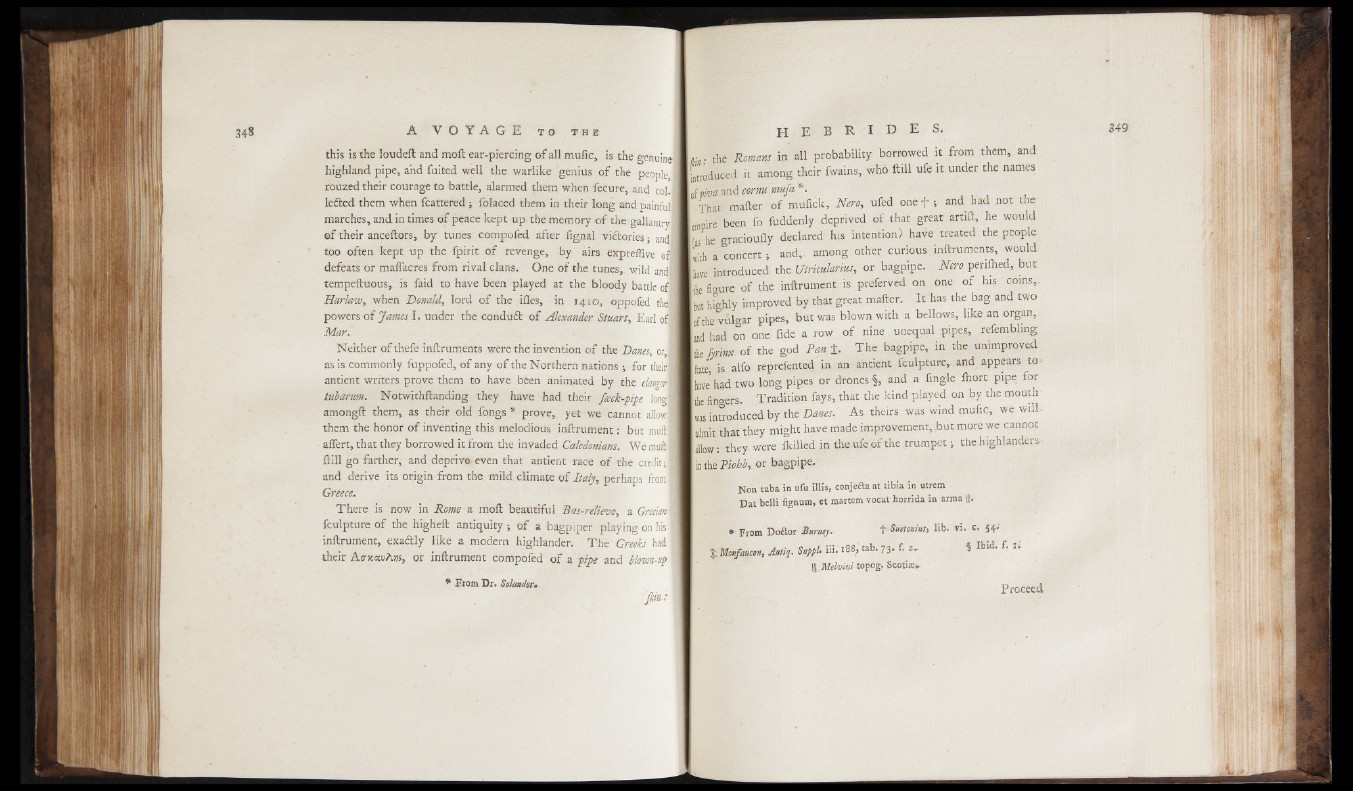
this is the loudeft and moft ear-piercing o f all mufic, is the genuine'
highland pipe, and fuited well the warlike genius o f the people
rouzed their courage to battle, alarmed them when fecure, and col-
leiled them when fcattered ; folaced them in their long and painfuj
marches, and in times of peace kept up the memory o f the gallantryl
of their anceftors, by tunes compofed after lignal victories; and!
too often kept up the fpirit o f revenge, by airs expreffive o f l
defeats or maffacres from rival clans. One of the tunes, wild and!
tempeftuous, is faid to have been played at the bloody battle ofl
Harlaw, when Donald, lord of the ifles, in 1410, oppofed tlie]
powers o f James I. under the conduit of Alexander Stuart, Earl ofl
Mar.
Neither of thefe inftruments were the invention o f the Danes, or,I
as is commonly fuppofed, of any of the Northern nations ; for theitl
antient writers prove them to have been animated by the clangtrm
tubarum. Notwithftanding they have had their fceck-pipe long*
amongft them, as their old fongs * prove, yet we cannot allow!
them the honor o f inventing this melodious inftrument: but mult!
affert, that they borrowed it.from the invaded Caledonians. We mult!
ftill go farther, and deprive even that antient race of the credit;!
and derive its origin from the mild climate of Italy, perhaps from|
Greece.
There is now in Rome a moft beautiful Bas-relievo, a Gredttnm
fculpture o f the higheft antiquity ; o f a bagpiper playing on his I
inftrument, exaftly like a modern highlander. The Greeks had 1
their Ao-xauAus, or inftrument compofed of a pipe and blown-up I
* From Dr* Solaudef«
L : the Romans in all probability borrowed it from them, and
i n t r o d u c e d it among their fwains, who ftill ufe it under the names
ofiOTKZ.and.cornu mufa*. ' ,
That mailer of mufick, Nero, ufed one f ; and had not the
empire been fo fuddenly deprived o f that great artift, he would
if he gracioufly declared his intention) have treated the people
¡.¡th a concert; and,, among other curious inftruments, would
liave introduced the Utricularius, or bagpipe. Nero penftied, but
the figure of the inftrument is preferved on one of his coins,,
tat highly improved by that great matter. It has the bag and two
I f the vulgar pipes, but was blown with a bellows, like an organ,
L d had on one fide a row of nine unequal pipes, refembling
j th tlyrinx of the god Pan t- The t>agP'Pe> in the unimproved
itote, is alfo reprefented in an antient fculpture, and appears tot
e had two long pipes or drones §, and a fingle ihort pipe for
the fingers. Tradition fays, that the kind played on by the mouth
L a s introduced by the Danes.' A s theirs was wind mufic, we will*
admit that they might have made improvement, .but more we cannot
allow: they were ikilled in the ufe of the trumpet; the highlanders
inthtPiobb, or bagpipe.
Non tuba in ufu illis, conjeaa at tibia in utrem
Dat belli lignum, et martem vocat horrida in arma 1|.
* From Doctor Burney. \ Suetonius, lib. vi. c. 54'
% Uonfaucon, A nM Suppl. In. 188, tab. 73. f- J - 5 Ibid' f -
SXMdoiini topog. Scotia:»
Proceed